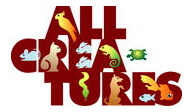Feeding:
Most "small birds" will eat anything (omnivorous). They should be offered a variety of food for their choice. Include:
-
Meats
-
Low fat canned dog food
-
Small puppy kibble
-
Broiled chicken
-
Strained beef baby food
-
Hard-boiled chicken egg yolk
-
Live insects (meal worms)
-
-
Grains
-
High protein dry baby cereal
-
Wheat germ and corn or oatmeal crushed to a powder in a blender.
-
The best diet for "meat eaters" is whole live or freshly killed mice, rats, guinea pigs, chicks, etc.
Hand feeding is best accomplished with the help of the rounded end of a chopstick or a piece of cardboard. The food mixture should be the consistency of thick paste so it can be molded into pellets of swallowable size. A vitamin /mineral supplement which contains vitamins D2 and D3 should be included in the ration of all wild birds. Self feeders should have a mineral-iodized salt-grit in a dish in their cage. Some of the mature birds need force feeding at first, and most of them will gradually eat voluntarily. Suffocation will occur if too much food or too much liquid is given at one time.
Housing:
All efforts should be maintained to keep the bird in its natural environment.
Keep the bird in a dark, quiet place, at normal room temperature (70 to 75 degrees). The environment should be as free of human exposure as possible and the bird should not be tamed. Partially covering the cage with a piece of sheet is useful, and allow the uncovered end of the cage to be exposed to daylight. Provide sufficient space. Small birds should be housed in a cage large enough for flight with appropriate perches and food. Meat eaters need special rehabilitation techniques. Water birds need a body of water and flight space.
Release:
Consult the local Audubon Society or Wildlife rescue group prior to releasing the bird. The locale has to be a natural habitat; there should be other birds of the same species; there should not be an overcrowding of that species; the captive bird should not be too tame; and there should not be any predators.
